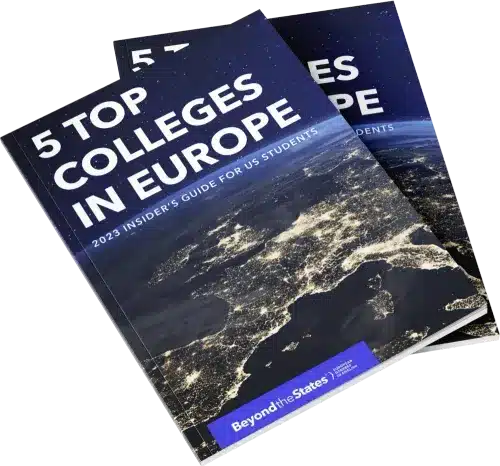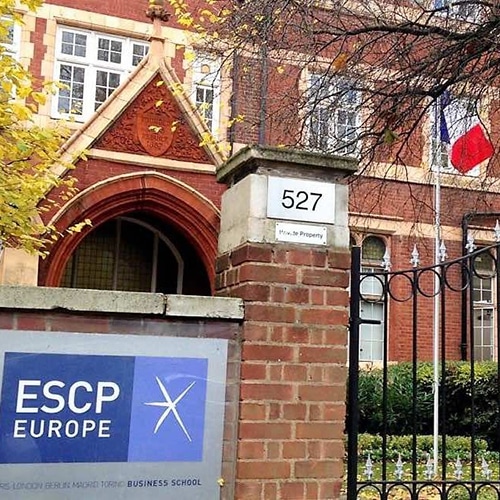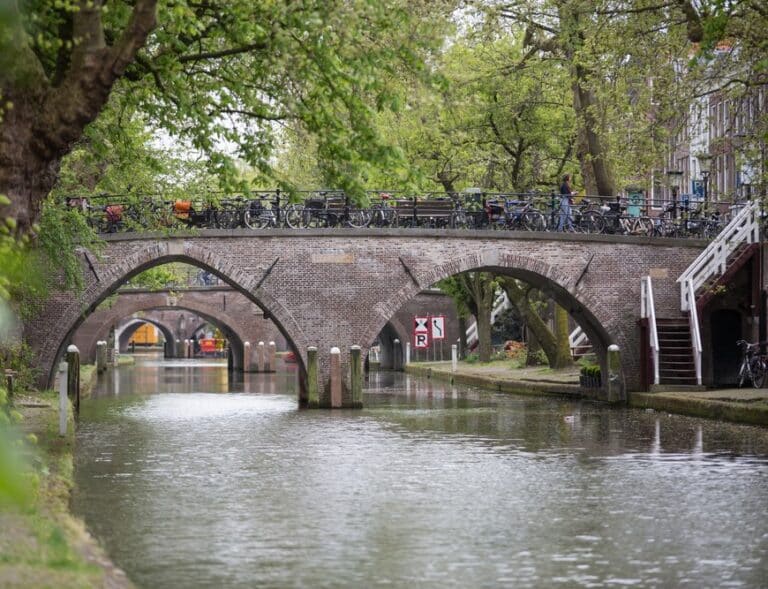How to Get a Business Management Degree in Europe
Hey there! My name is Anya, and I’m from Boulder, Colorado and am currently in my third and final year at ESCP Business School in their BSc in Management program. This is a very unique program, which allows us to study in three different countries, moving each year to a different campus they have around Europe. The school itself was founded in Paris, France, and is one of the oldest business schools in Europe. It’s well known for its masters programs, which are for the most part taught in English, and within the past few years has started gaining recognition for their English-taught bachelor’s program.
It is a private school, meaning higher tuition than most universities you’ll find through Beyond the States. But since I hold dual American-Austrian citizenship through my parents, I pay the European tuition (around 13k Eur per year), whereas non-EU students will likely pay more. This is excluding housing and living costs, so factoring in everything, I pay about as much as I would for an out-of-state university, and around $25k more than what I would pay for an in-state school. However, I finish in 3 years, and I get a double degree (French and German), but more on that later.
Strategize the Path to College in Europe
We’ve set aside some time this week for one of our admissions experts to help
serious applicants with some ideas. Book a FREE call today; spots are limited!
I attended my first year on their London campus, which is in the quaint area of West Hampstead, about a 30 minute underground ride to London center. Though ESCP doesn’t provide housing, in each city there’s always student housing options and of course the option to share an apartment with other students or with locals. I chose to live in a student accommodation my first year, so I could meet other students and ease into living on my own. This was a popular choice by ESCP students, which I knew from the beginning, so that made my choice easier. I lived with 7 other people whom I shared the kitchen and living area with, and then I had my own small bedroom and bathroom. Beside the housing, I was able to get to know my fellow classmates through induction day, Whatsaapp groupchats, and student-proposed meet ups at the accommodation or within the city (this was all pre-pandemic).
In the bachelor program, the classes are pre-set and we don’t get to choose what we take until third year when we have some electives options. During the year in London, we had many introductory classes such as accounting, psychology, microeconomics, presentation and rhetoric skills, world history, mathematics, law, statistics, and computer skills (Microsoft Office). We also had a credit called ‘collective project’ in which we had the liberty to choose our group and a business project, as long as it followed certain guidelines. Some people created charity companies, others a ‘running dinner’ club, and my group decided to do a podcast called ‘Name It’, where we discussed a wide range of topics and had some of our classmates join special episodes.
FREE INSIDER’S GUIDE

Top 5 English-Taught Colleges in Europe
Kickstart you education abroad with a powerful degree taught entirely in English, all without taking on any student loans!
My second year took place on the Paris campus, the headquarters and biggest campus of ESCP. I lived with two of my best friends in a shared apartment, which we rented through Airbnb. It was a two minute walk from campus, which made it easy for when we had in-person classes. Our courses in the second year were mostly building upon first year’s classes and consisted of marketing, macroeconomics, taxation and e-commerce law, contract law, finance and accounting, Python coding, statistics 2, and intercultural skills. Since I was in Paris, my tax and e-commerce law classes were taught in French. In Madrid, different classes of theirs were in Spanish, and in Turin everything was English. To go to Paris or Madrid during our second year, we were required to have a certain level (B2) in French or Spanish. Like the first year, we had another credit of collective project, in which the school collaborated with the ChangeNOW Summit and each group researched sustainable initiatives and companies in certain industries (carbon capture, urban farming, fashion, audiovisual industry, etc).
Each year we also take language classes, usually corresponding to the campuses we attend (except English, no English classes are taught since there’s an English requirement for program entry). For me, that was French and German, since my third and current year is in Berlin, Germany. This is the year we are able to choose elective classes each semester, split into two parts – management elective and liberal arts elective. The management elective is split into ‘tracks’, with each track consisting of two classes. When you choose a track, you have to take both classes it offers, you can’t pick two different classes from two different tracks. The tracks offered were marketing, finance, management, and digitalization/entrepreneurship. The liberal arts elective is just a single class we can each choose, usually centered around humanities, such as negotiations, international relations, big data, conscious leadership, and others. This is also the year we complete a bachelor’s thesis on a topic of our choice. We chose our topic and thesis advisor in the fall, and the spring semester is the time where we really have to crack down and write it out. Based on a blockchain class I took in the digitalization elective, I decided to focus my thesis on how smart contracts (on the blockchain) would disrupt the real estate transaction process (now that’s a mouthful!). I learned that with such a general management degree, there is no right or wrong thesis, and the topics I heard people chose are so varied, from corporate volunteering, to sustainable finance, to NFTs, to luxury marketing, and so on.
Going back to what I said at the beginning, about a double degree – since ESCP has its primary campus and founding in France, but many students graduate from the Berlin campus, those students may be eligible to receive both degrees! The French one is called a Diplôme Visé BAC+3, while the German is the classic BSc in Management that is based on the American standards, however they both mean the same thing and are equivalent. I do want to point out though, to those considering going to ESCP, that in order to get the German BSc (the more recognizable title, but no difference in value!), you would have to a) graduate from the Berlin campus (i.e., it needs to be your third year campus), and b) meet the same requirements that a classic German high school student would meet – so start planning ahead! For me, these requirements looked similar to the following:
- At least 16 “academic units” in the last 4 years of high school
- 4 English units
- 2 foreign language units
- 3 social studies units
- 2 or 3 math units and 2 or 3 science units (to make a total of 5)
Alongside those, there are also AP requirements – 4 AP exams with minimum grade of 3:
- English
- Foreign language
- Math or science
- Additional (can be humanities, comp sci, etc)
Of course, requirements change and I know that they are constantly revamping admissions and even the program outline and campus options, so be sure to check with the admissions officer about what the requirements look like. It’s been a wonderful ride at ESCP, and to hear more about student life and information I wasn’t able to include here, check out this podcast episode!
–Anya







